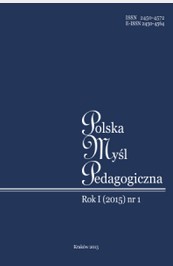TEORIA ROZUMOWANIA MORALNEGO – ZARYS SYNTEZY
THE THEORY OF MORAL REASONING – AN OUTLINE OF SYNTHESIS
Author(s): Urszula Gruca-MiąsikSubject(s): Education, Ethics / Practical Philosophy, Cognitive Psychology, Behaviorism
Published by: Wydawnictwo Uniwersytetu Jagiellońskiego
Keywords: moral reasoning; morality; education; man; development;
Summary/Abstract: The theory of moral reasoning exposes the correlation between thinking and moral behavior as well as the passage of its development through subsequent stages. Adequately to the child’s cognitive development, his or her moral reasoning ability also develops, i.e. the competence to analyze and evaluate events and situations in the context of social rules and norms. In my definition of moral reasoning, I consider it as a conscious and purposeful thought process, by means of which a given individual defines the difference between good and evil in relation to ideas, situations and behaviors of one’s own and other people. The moral reasoning of the individual, which opens up space for educational activities, is a synthesis of personal and environmentally conditioned factors. Fortunately, in the last decades, in Anglo-Saxon environment, but also in Poland with my participation, research with this and many other contexts of moral reasoning has appeared.
Journal: Polska Myśl Pedagogiczna
- Issue Year: 5/2019
- Issue No: 5
- Page Range: 123-141
- Page Count: 19
- Language: Polish

